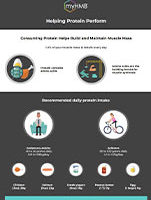The Protein Problem
While consuming protein offers support in the fight against muscle loss, it can be an uphill battle to consume the amount your body needs. Underlying factors such as your age and protein quality can impair the body’s ability to utilize amino acids for protein synthesis. Thus, protein intake is not the only factor regulating muscle mass.
The Institute of Medicine recommended daily allowance (RDA) of protein for adults is 0.8 grams of protein per kilogram of body weight each day.1 Some researchers have hypothesized that the Institute of Medicine recommended RDA is not sufficient for all adults (for example, older adults or those with functional limitations), and that higher protein intake would promote muscle anabolism and confer additional muscle health benefits.
However, multiple clinical trials have failed to support this hypothesis, showing no benefit of consuming protein in excess of the RDA on muscle mass, strength, function in middle aged and older adults.2 In a well-controlled clinical trial of older men (over the age of 65) with functional limitations, protein intake well over the RDA (1.3 grams of protein per kg of body weight a day) did not increase lean mass, muscle performance, physical function, or well-being among men already consuming the RDA of protein.3 Similarly, adding 30 grams a day of supplemental protein did not improve the maintenance of muscle mass or physical function in healthy older women (70-80 years old) who were protein-replete, despite evidence of deterioration in muscle measurements in the upper limb.4 In a meta-analysis of 15 studies evaluating the effects of protein and amino acid supplementation on resistance exercise training outcomes in older adults (over the age of 60), showed no significant benefit of supplementation on muscle strength, muscle size, functional ability, or body composition.5 Similar results have been observed in middle-aged adults (40–64 years old)6; boosting protein intake above the RDA did not enhance exercise-induced improvements in strength, body composition, or health biomarkers.
Together, these studies highlight that extra protein alone is not the nutritional solution for improving muscle health (ie, muscle mass, physical function) in middle-aged or older adults.
















